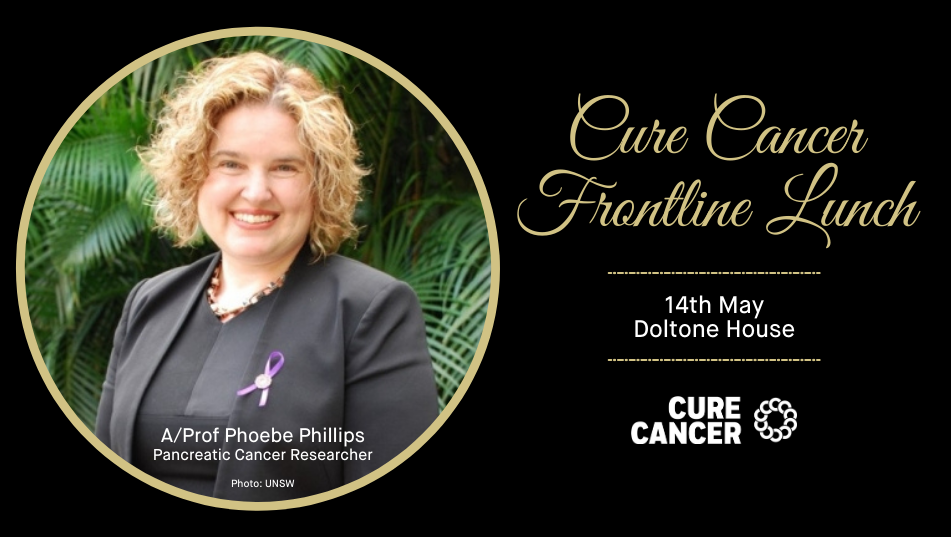Cure Cancer alumna A/Professor Phoebe Phillips and her team at UNSW have achieved a world-first pancreatic cancer breakthrough, with hopeful implications for patients worldwide.
A/Prof Phoebe Phillips’ latest achievement with her UNSW team has unlocked a crucial development in understanding the mechanics of cancer.
Together, they have successfully grown a complete human pancreatic tumour model in a petri dish, offering a comprehensive view of the tumour for 12 days to analyse and test the effects of different drugs on the specimen.
With the findings published in leading journal Scientific Reports, this development can give researchers greater insight into how tumours react to different treatments.
“Essentially, we are trying to mimic the tumour in a way that best allows us to test therapeutics,” Phoebe said.
“This is the first model of its kind that lasts this long – other labs have done something similar, but only for two or three days, and even then it doesn’t quite maintain the viability and the architecture of the tumours. Crucially, our team’s model stays intact for 12 days and offers a complete view of the tumour – an approach that has great potential for testing the effect of different drugs on the cancer and offering personalised medicine approaches to patients down the track,” she said.
“What it will allow us to do is test up to 10 different drugs simultaneously on a surgical specimen. Because you get the result in a couple of weeks, you could go back and inform the clinical team about which drug is working best on a particular patient’s tumour – we hope that it’ll end up being a really rapid way to feedback into the clinical situation.”
Without the rapid growth of technology currently, Phoebe’s discovery would not be possible.
“We now have the ability to delve really deep into a cancer cell and see molecular interactions. This really helps us nut out more accurately why a cancer cell is resistant to therapy and the precise mechanism of how each therapy is working. Also, scientists like me are an integral part of multidisciplinary clinical teams – which is having a positive impact on selecting patients for a particular treatment based on the science and also increasing translation of basic research into the clinic.” she said.
The need for funding
For many cancer researchers, breakthroughs like Phoebe’s are career milestones to work towards. However, with the current research landscape, funding can often be difficult to acquire for early-career scientists. As Phoebe explains, “It is increasingly challenging for researchers to obtain funding to support their salaries and also the research. When I started out, funding success rates for grants was around 26% and now for most schemes, it is less than 10%. I really worry about the long-term impact of this on our capacity as researchers to deliver improvements in cancer treatment and patient outcomes.”
“Research is the foundation and essential part of every new cancer drug or early diagnostic or screening tool. Together with clinical teams – research is the only way to fast-track better treatments to improve patient survival, reduce side effects and eventually find cures for all cancers.”
“Nurturing early-career researchers and providing funds to support their own idea is critical – it allows them the freedom to be innovative, and to lead the management and direction of their own idea. This is essential for them to demonstrate their capacity to deliver so that others will invest and back them in the future. It helps ECRs build their track record and helps them develop team leadership skills and technology skills,” she said.
Research like Phoebe’s simply could not happen without the support of generous donors. Cure Cancer receives no government funding, and it is therefore crucial that funds are raised to support groundbreaking research projects like Phoebe’s.
For the past 54 years, Cure Cancer has invested in young scientists at the very start of their cancer research careers. Many of these researchers have gone on to become leaders in cancer research globally, making breakthroughs that have the changed the outlook for countless cancer patients worldwide.
Join Cure Cancer for a waterfront lunch to celebrate those at the frontline of cancer research, and hear from an inspirational panel of speakers including A/Prof Phoebe Phillips, as well as Business Editor at The Australian and staunch supporter of Cure Cancer, Ticky Fullerton, and award winning nutritionist, author and Cure Cancer ambassador Michele Chevalley Hedge, whose personal connection to cancer has seen her use her expertise in nutrition and wellness to help others maintain their health.
All funds raised from the event will go towards funding another lifesaving cancer research project.
Purchase your tickets today: curecancer.com.au/frontline-lunch












